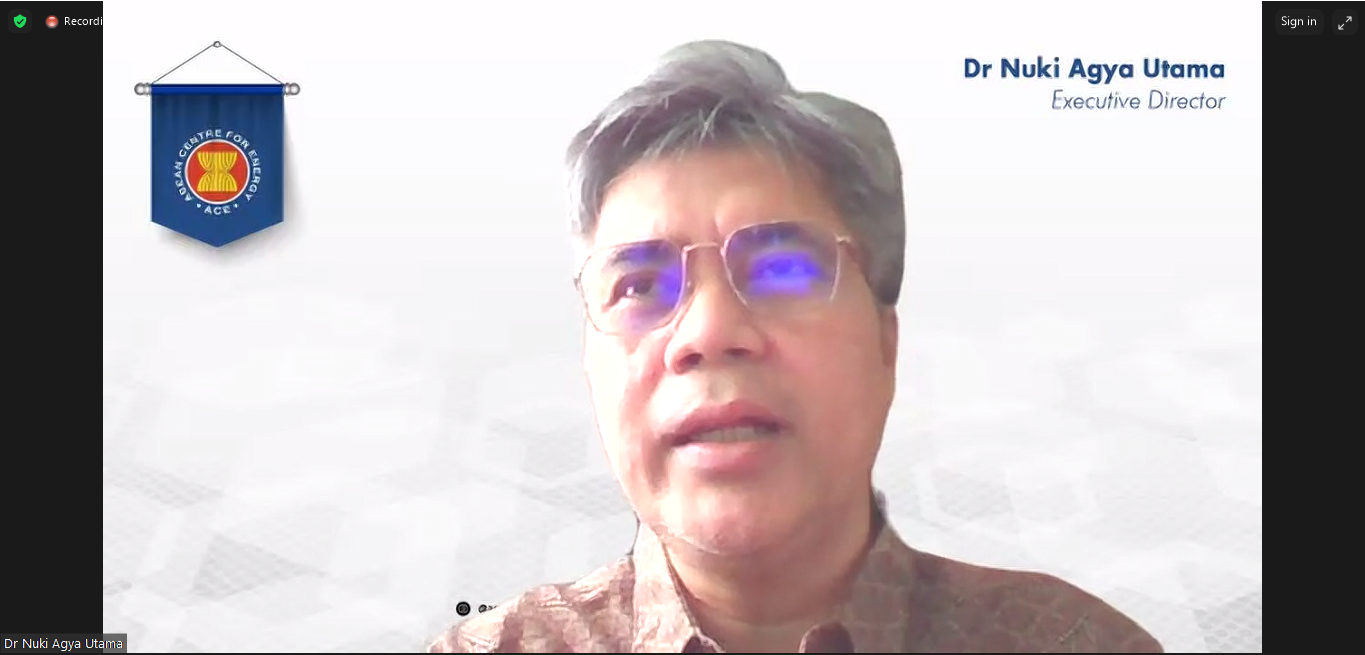Menu
The ASEAN Centre for Energy (ACE) hosted a virtual seminar to launch the ASEAN Energy Booklet Volume 1: Low Carbon Hydrogen in ASEAN on 26 January 2024. Attended by more than 200 participants, the seminar invited policymakers and technology experts from the Ministry of Energy and Mineral Resources of Indonesia, NanoMalaysia Berhad, and Honeywell, to discuss the current situation and the future of hydrogen development in ASEAN.
Based on the findings of the 7th ASEAN Energy Outlook (AEO7), ASEAN’s total energy demand is projected to triple by 2050, with oil retaining the largest share of Total Energy Final Consumption (TEFC). In response, ACE has launched the ASEAN Energy Booklet, addressing the potential of hydrogen as one of the strategies in realising the decarbonisation agenda and aiming to offer comprehensive information on low-carbon hydrogen, contributing to the streamlined process of formulating clean energy policies. The hydrogen booklet presents an overview of how hydrogen technology has huge potential in ASEAN, provides updates on the current state of hydrogen technology and development within ASEAN, explores emerging opportunities, and outlines the path forward for hydrogen in the region.

Photo 1. Opening remarks by Dr. Nuki Agya Utama, Executive Director of ACE
The event commenced with the opening remarks from Dr. Nuki Agya Utama, Executive Director of ACE, highlighting the crucial need for dialogue among ASEAN Member States (AMS) to tackle upcoming challenges and transition towards a low-carbon energy future.
Nadhilah Shani, Senior Research Analyst of Power, Alternative Energy, and Storage (PFS) Department, digests information regarding several technological developments in the energy sector in ASEAN and discusses the content of the booklet. Shani underscores the advantages of transitioning to low-carbon hydrogen technology in the future and emphasises the critical importance of fostering cooperation among ASEAN Member States to resolve the current challenges of mitigating the high production costs of hydrogen in ASEAN.

Photo 2. Panel discussion moderated by Dr. Ambiyah Abdullah, Senior Research Analyst of MPP
The event proceeds with a panel discussion moderated by Dr. Ambiyah Abdullah, Senior Research Analyst of Energy Modelling, Policy, and Planning (MPP) Department. The discussion involves insights from several energy experts in ASEAN. Zulfan Zul, representing the Ministry of Energy and Mineral Resources of Indonesia, provides an explanation of Indonesia’s policymakers’ perspective on hydrogen technologies, emphasising the necessity for intervention in Indonesia’s national hydrogen strategy.

Photo 3. Presentation by Dr. Rezal Khairi Ahmad from NanoMalaysia Berhad and Muhammad Amri from Honeywell
Dr. Rezal Khairi Ahmad, Chief Executive Officer of NanoMalaysia Berhad, provided an in-depth overview of Malaysia’s national policy on hydrogen technology. Dr. Rezal highlighted how hydrogen technology serves as a viable option for a long-term decarbonisation strategy. Muhammad Amri, Universal Oil Products (UOP) Manager of Indonesia at Honeywell, shared insights on the current status of hydrogen technology advancement, and the projection of global hydrogen supply and demand over time. Dr. Ambiyah concluded the session with three (3) main keywords: policy and regulation, transition, and innovation, to accelerate low-carbon hydrogen development in ASEAN.
Beni Suryadi, Manager of PFS, ended the seminar by expressing gratitude to the panellists and participants, while also expressing hope that the insights from this booklet and forthcoming studies would offer a valuable analysis to develop a cleaner policies and regulations to support the development of hydrogen technologies in the region.
